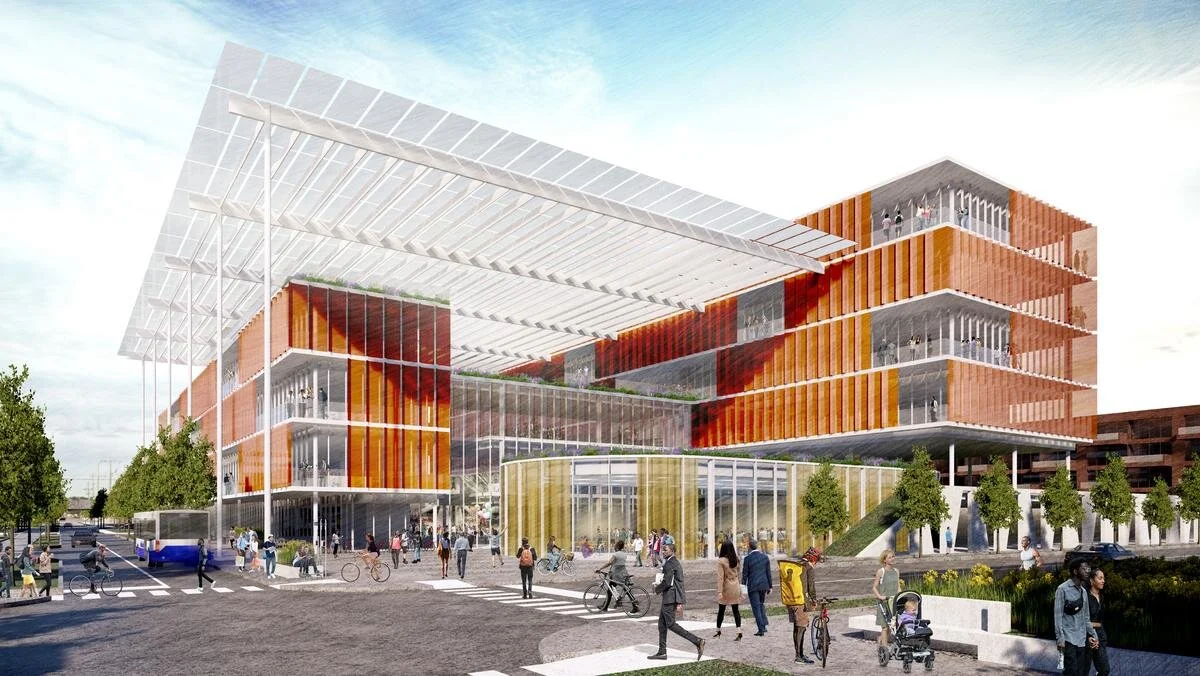This month’s KC Downtowners luncheon featured Kevin McGinnis, president and CEO of Keystone Community Corporation, who presented to a virtual audience on August 11, 2021.
“Bringing people together” is the mission of Keystone, an independent 501(c)(3) nonprofit organization created to unite regional universities, philanthropic leaders, corporations and entrepreneurs with the goal of planning, developing and operating a diverse and thriving innovation community in downtown Kansas City.
“One of the things that we believe is that we can come up with the solutions that the world is waiting for if we have the opportunity to bring people together,” McGinnis said.
Launched in 2018, Keystone conducted a market assessment and feasibility study. McGinnis said the first year was spent answering these questions: Can we do this in Kansas City? Does Kansas City need an innovation community? Can we sustain all of the headwinds that we have as a region, including the state line divide and the fragmentation between the region’s university systems?
“When we talk about bringing people together, we think of innovation and the way we see the future of innovation is that it’s not a solo act. It requires collaboration, and it requires cross-industry collaboration,” McGinnis said.
Moving forward, McGinnis said Keystone started its civic engagement and selected its location. The Keystone Innovation District will be located along the 18th Street corridor, integrated into the fabric of four neighboring districts: Crossroads to the west (arts), 18th and Vine to the east (Black heritage), Downtown to the north (business and political) and Hospital Hill to the south (healthcare and medical).
“The obstacles that we face are enormous, and no one company or institution can solve these challenges. We have what we need here within this region, this bi-state region that is Kansas City,” he said.
Although the Keystone Innovation District requires physical development and placemaking, McGinnis emphasized that it is not a real estate project.
“It needs to live in a place, so it, therefore, lives in a city, and we think the best place for that programming to be most successful is the location that we’ve identified with Keystone. But this is an opportunity for us to bring together assets and stakeholders from across the bi-state region,” said McGinnis.
For the past year, Keystone has focused on programming and creating intersections. McGinnis said Keystone plans to bring nine of the region’s higher education institutions - UMKC, Kansas City Art Institute, Metropolitan Community College, Kansas City University, Park University, William Jewell College, University of Central Missouri, University of Kansas and Kansas State University - into Kansas City’s urban core.
“While some might say higher ed isn’t very innovative today, it’s the environment that they create with their students and with their research expertise that really creates a catalyst for innovation in most of the successful innovation markets that we’ve seen throughout the world. So this group of institutions is extremely important to what we’re trying to accomplish,” McGinnis said.
McGinnis noted that Kansas City has a very diverse industry set on the corporate side, and there are no natural connections between a lot of the major industry players. They serve different customers and market segments; but, McGinnis emphasized you have to break the silos down and start to get these groups together.
“One of the things that we wanted to do was to create a platform, create an entity that allows them to sit at the table with each other and talk about those innovation challenges, identify their major problems and see where they can help each other out,” he said.
In October 2020, Keystone and VMLY&R created Keystone Labs, a studio model comprised of three different studios. The Ideation Studio will connect corporations to entrepreneurs and startups. The Collaboration Studio will focus on community-based challenges like health outcomes and alternative paths for the workforce. The Growth Studio will provide ongoing support for growth-stage opportunities and learnings.
Keystone also is partnering with LaunchKC, a nonprofit initiative co-founded by the Downtown Council of Kansas City and the Economic Development Corporation of Kansas City. McGinnis said this partnership allows both organizations to share resources and expenses to create greater outcomes.
Keystone is built on the pillars of equity and inclusion.
“The planning, development and operations of this district have to be built on the pillars of providing a more equitable future in tech and venture, providing more inclusive community and really driving the key cornerstones of diversity and inclusion in all that we do from the dirt up,” said McGinnis.
McGinnis said Keystone must grow its organizational capacity to meet its goals and to better position it to compete for federal funds available under the United States Innovation and Competition Act of 2021.
“There’s $7 billion that’s going to be distributed among 18 regional technology hubs, and Keystone gives Kansas City a good opportunity to be at the table,” he said.
To learn more about the Keystone Innovation District, visit www.keystonedistrict.org.

